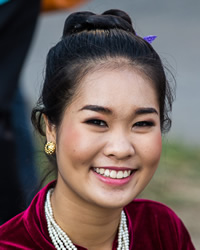Tai Don, White Tai in Vietnam

Photo Source:
John Shedrick - Flickr
Creative Commons
|
Send Joshua Project a map of this people group.
|
| People Name: | Tai Don, White Tai |
| Country: | Vietnam |
| 10/40 Window: | Yes |
| Population: | 349,000 |
| World Population: | 490,000 |
| Primary Language: | Tai Don |
| Primary Religion: | Ethnic Religions |
| Christian Adherents: | 1.00 % |
| Evangelicals: | 0.25 % |
| Scripture: | New Testament |
| Ministry Resources: | Yes |
| Jesus Film: | Yes |
| Audio Recordings: | Yes |
| People Cluster: | Tai |
| Affinity Bloc: | Southeast Asian Peoples |
| Progress Level: |
|
Introduction / History
The White Tai speak a tonal language, Tai Kao. They are members of a larger cultural linguistic group of Tai peoples that includes the Laotians, the Shan and others.
They are an influential people who inhabit the narrow upland valleys of northeastern Laos.
Centuries ago, the White Tai lived in China. Relentless pressure by the Chinese gradually forced them southward. Eventually they settled along the Red and Black Rivers, where they settled near the Honghe River. In Laos, they are called Tai Kao, but in neighboring Vietnam they are called White Tai.
What Are Their Lives Like?
The White Tai are extremely polite, respectful, and hospitable. Their children are brought up to respect those of a higher rank and to become self-reliant individuals. Age is highly respected in White Tai society. Type of occupation, wealth, and place and type of residence follow age in terms of respect and rank. Rural farmers rank below craftsmen, merchants, and city government officials; and clergy are a separate group.
Families are the core of White Tai society. In rural areas, the entire immediate family lives together with mutual respect for each other. A young married couple may live with the wife's family until they can establish their own home. The father is the head of the family, and White Tai husbands and wives appear to have a harmonious relationship. In fact, they are distinguished by an almost equal division of labor by sex. Both men and women plow, fish, cook, tend to the babies, clean house and wash clothes.
The White Tai live in small, self-governing villages that are usually limited to a single valley. Each village is under the control of the chao muong, or prince, to whom the commoners pay taxes.
Most of the White Tai live on small valley farms, where they grow wet rice using irrigation and terraces. They grow opium as a cash crop. The construction of new roads has helped increase accessibility to the rural areas. Chinese shops have opened in several market towns and Chinese merchants often visit White Tai villages to do business.
What Are Their Beliefs?
They are primarily Theravada Buddhists, in contrast to the majority of Lahu peoples who are either animists or Christians.
What Are Their Needs?
There is no scripture reported available in the Kucong language, or other resources such as gospel recordings.
Prayer Points
Pray for someone to explain the gospel to the White Tai people in a way they can understand it without compromising the gospel message.
Ask the Lord of the harvest to send loving and dedicated laborers into Laos to minister to the needs of the Tai Don.
Pray that the Holy Spirit will move soon to result in church plants and discipleship.
Ask the Holy Spirit to soften the hearts of the Tai Don towards the gospel and give them spiritual hunger.
Scripture Prayers for the Tai Don, White Tai in Vietnam.